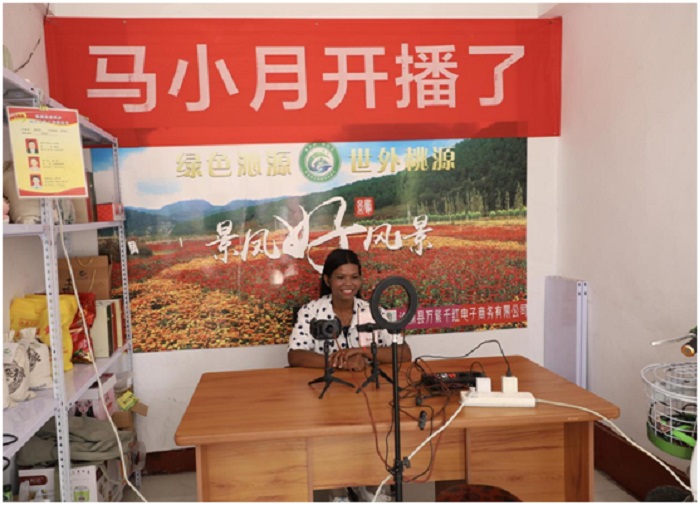



After she married a Chinese villager in north China’s Shanxi province, San Hmwe, a Myanmese whose Chinese name is Ma Xiaoyue, settled in her husband’s hometown and can now even speak fluent local dialect.
Ma and her husband Gao Baohong met and fell in love when they were both working in Myanmar. In fact, after hearing stories about China when she was little, Ma has always wanted to visit the big country.
Fourteen years ago, she came to Jingfeng village, Qinyuan county, Shanxi, with her husband. At first, Ma could barely understand Mandarin, not to mention local dialect. To fit in as soon as possible, she would learn Mandarin with TV shows every day and local dialect from residents in the village.
As she could speak Mandarin and local dialect better and better, Ma feels more at home here. Meanwhile, she finds her life getting happier.
In 2014, a resident working team was sent to Jingfeng village to help local people fight poverty. With a loan got with the help of the working team, Ma’s family joined the village’s cattle-raising cooperative.
“There are a dozen head of cattle in the cooperative, which are from various households in the village. Each household sends one person to pasture the cattle during the day in turn,” Ma said, adding that raising cattle brings her family an annual income of more than 10,000 yuan ($1,572).
Meanwhile, benefiting from government policy, her husband Gao became a forest ranger, and has earned an income of over 10,000 yuan a year by protecting and patrolling forests and mountains regularly.
As their income constantly increases, the living environment of Ma’s family has also improved continuously.
Thanks to a project launched by Jingfeng village to renovate dilapidated houses, Ma’s old house took on a new look. “The wooden window frames were replaced by aluminum alloy ones, and the earth walls were changed into brick walls,” Ma recalled.
In front of Ma’s house flows a river which is about seven or eight meters wide. In the past, people had to step carefully across the river on stone piers. In rainy season, the river would rise and submerge the stone piers, which made it difficult for children to go to school.
To help residents cross the river safely, the village built a new suspension bridge over the river last year. “I no longer worry about my kids being late for school,” Ma said.
Ma enjoys sharing the constant changes in her life in China with her mother and sister back in Myanmar when speaking with them over video calls.
“Our village has witnessed tremendous changes during the past few years,” said Ma excitedly. By carrying out projects to improve the infrastructure, the picturesque village located in the hinterland of Taiyue Mountain has effectively promoted rural tourism in recent years.
Ma’s family also took the opportunity to develop tourism-related business. “We have several spare rooms. So we decided to refurbish them to develop agritainment business on the advice of village cadres,” she said.
While decorating the rooms, she also opened an account on a short video platform to share with Internet users her everyday life in Jingfeng village through livestreaming, winning thousands of followers.
Last year, the government of Qinyuan county promoted local agricultural products online, and Ma was invited to be a host to help promote the products via livestreaming platform.
“I was really nervous during my first livestreaming show. At first, I had only dozens of viewers and only sold locally grown millet, mushrooms, wood ears and other products. Many people who placed orders were probably local residents who wanted to show their support,” Ma recalled.
Ma took part in several other livestreaming shows for sales promotion afterwards. “The number of viewers has gradually risen. I once helped sell several thousand yuan worth of products during one show, and my earnings also grew,” Ma said.
A Myanmese song called “For Ma” was popular on the social media platforms in Myanmar a few years ago. Ma often uses it as background music when making short videos. The Chinese version of the song is “the world is so big but I still meet you”, according to Ma.
“I feel like it is talking about how destiny leads me to my husband, and also the close “Paukphaw” (fraternal) friendships between the Myanmese and Chinese people,” Ma said.
“Hand in hand we lived for so long. Though far apart, we do keep our story deep in mind,” she quoted the lyrics.


The Executive and members of the.


The Acting Director, FCT Directorate of.


President Bola Ahmed Tinubu has been.



Barely a month after resignation of.


An Abuja based Legal Practitioner, Osuagwu.



Convener of Equitable Remedy, Mrs. Magaret.


Contractors handling the contract for city.


Nigerian government may have concluded plans.


The Diplomatic Correspondents Association of Nigeria.


A rights group, “Follow Me Talk.
Leave a Comment